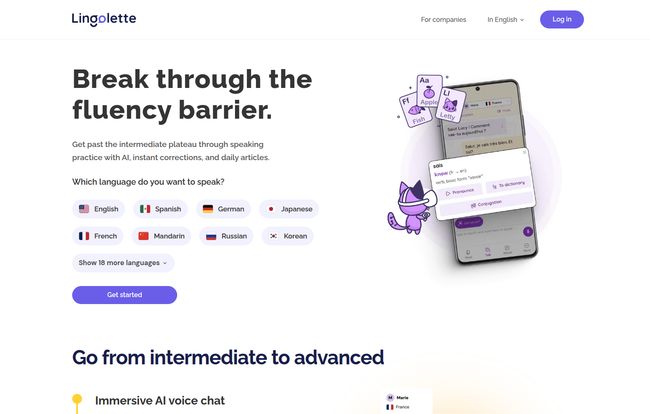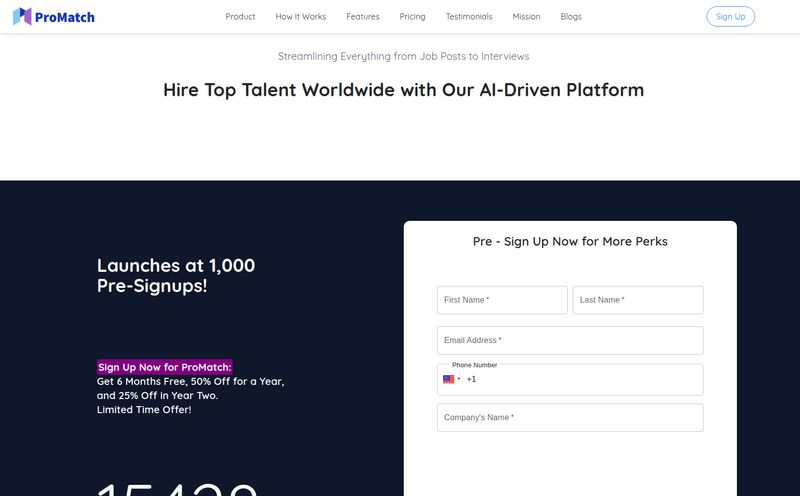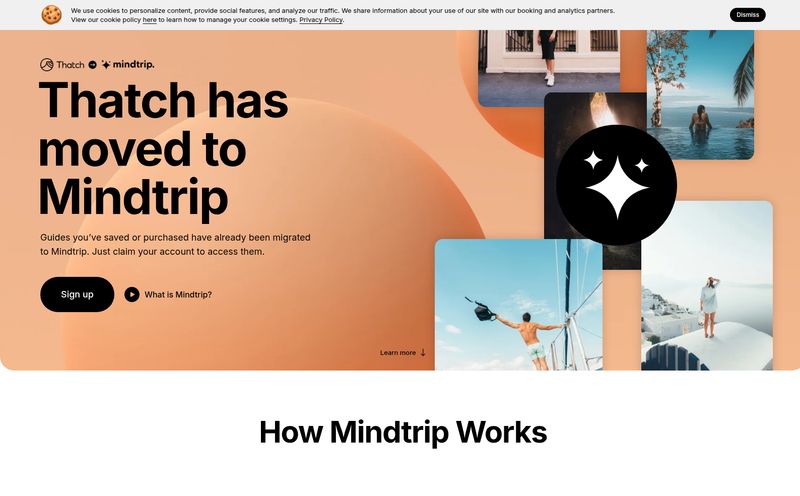We've all been there. You've dutifully worked through the beginner apps, you know the basic grammar, you can order a coffee without causing an international incident. But then… you stall. You're stuck in that awkward, frustrating space between 'tourist' and 'fluent speaker.' It's the dreaded intermediate plateau, a place where progress feels glacial and real conversations seem just out of reach. I've personally spent what feels like an eternity on this plateau with my Spanish, able to understand a lot but freezing up when it’s my turn to speak.
It’s a common problem, and frankly, a huge reason why many people just give up. Finding consistent, low-pressure speaking practice is tough. Tutors can be expensive, and language exchange partners can be flaky. So, when a tool like Lingolette pops onto my radar, promising to break that very barrier with AI, my interest is definitely piqued. But is it just another tech gimmick, or is it the real deal?
What Exactly is Lingolette?
At its heart, Lingolette isn’t another flashcard app or grammar drill machine. Thank goodness. We have enough of those. Instead, it positions itself as an AI-powered conversation partner. The whole point is to get you comfortable with both spoken and written fluency by having you… well, speak and write. The platform is built around the idea of real-time conversations with an AI that's been specifically trained for language learning.
This isn't about just getting a stilted response from a chatbot. It's designed to simulate a natural back-and-forth, guide you, and correct you instantly, all from your phone or computer. It’s aiming to fill that gaping hole in most learners' routines: actual, consistent practice.
The Features That Actually Matter for Fluency
A platform is only as good as its tools. Lingolette seems to focus on a few core functions that directly target the intermediate slump.
The AI Voice Chat: Your 24/7 Practice Partner
This is the main event. Lingolette offers an immersive AI voice chat where you can talk about all sorts of things. The real magic here, in my opinion, is the removal of fear. There’s zero judgment. You can stumble over words, mispronounce things, and take forever to form a sentence without that sinking feeling of annoying a real person. The AI just waits patiently and then helps you. They even offer tutors with different dialects, which is a fantastic touch for anyone learning a language like Spanish or English, where regional accents can be a huge hurdle.
Learning Words That Stick (Finally!)
Rote memorization is the enemy of fluency. Learning a word from a list is one thing; knowing how to use it in a sentence is another entirely. Lingolette tries to solve this by focusing on contextual learning. As you interact with content on the platform, you can tap on words to get instant definitions and pronunciation guides. Because you’re learning the word within a real sentence or conversation, it’s so much more likely to stick in your brain. Its a much more natural way to build your active vocabulary.

Visit Lingolette
Daily Doses of Culture and Comprehension
To keep things interesting, the app provides daily articles on various topics. After reading, you get comprehension questions and, more importantly, you can then have a conversation with your AI tutor about what you just read. This is a brilliant loop. You read, you comprehend, and then you immediately put that new vocabulary and those ideas into practice by speaking about them. It turns passive learning into active use, which is the fastest way to progress.
Who is Lingolette Really For? (Let's Be Honest)
While any tool can be used by anyone, Lingolette has a very clear target audience. This is for the learner who is tired of being stuck. If you get nervous speaking, struggle to find practice partners, or find traditional language schools too expensive or rigid, this is designed for you.
"I've been having so much fun using Lingolette for French! It's difficult for me to find suitable platforms... a superb experience!"
It’s not for the absolute beginner who doesn’t know how to say “hello.” This is for the person who has the foundation but needs to build the house. It's for moving from intermediate to advanced—a journey that is often less about learning new rules and more about gaining confidence and automaticity. It’s for the person who wants flexible practice they can squeeze into a lunch break or a commute.
Can an AI Really Replace a Human Tutor?
Okay, let's address the elephant in the room. Can an algorithm truly stand in for a human teacher? The short answer is no, not completely. But maybe that’s not the point.
A human tutor brings cultural nuance, shared laughter, and genuine spontaneity that an AI, no matter how advanced, can't replicate. They can go off-script in a way that feels authentic.
However, the AI tutor has its own set of superpowers. It's available 24/7. It has infinite patience. It provides instant, data-driven corrections without a hint of judgment or condescension. I’ve always felt that the AI is like an infinitely patient sparring partner in a gym. It lets you practice your moves over and over again until they become second nature. The human tutor is the seasoned coach who watches you, gives you strategic advice, and prepares you for the real match. You probably need both. Lingolette serves as an incredible, affordable, and always-available sparring partner.
What's the Catch? The Cost of Lingolette
As of my review, Lingolette's website doesn't display a clear, public pricing table. This is pretty common for new platforms testing their models. They do, however, frame themselves as an affordable alternative to traditional language schools, which can easily run into hundreds or thousands of dollars. The value proposition is clear: you get near-unlimited practice for what is likely a monthly subscription fee that costs less than a few hours with a private tutor. For the most current pricing, you'll have to visit their site and likely sign up or start a trial.
My Final Take on Lingolette
I'm optimistic about tools like Lingolette. For years, language tech has been great at teaching vocabulary and grammar but has largely failed to address the biggest challenge: conversational fluency. Lingolette tackles this problem head-on. It’s a specialized tool for a specific, and very common, pain point.
It won't magically make you fluent overnight, nothing will. But it provides the one thing most intermediate learners are starved for: a safe and accessible space to speak. And by doing that, it might just be the crowbar needed to pry yourself off that frustrating plateau for good.
Frequently Asked Questions about Lingolette
- What languages does Lingolette offer?
- Lingolette offers a growing list of languages, including popular choices like Spanish, French, German, Mandarin, Japanese, and Korean, with over 10 more available on the platform.
- Is Lingolette good for absolute beginners?
- Not really. Lingolette is designed primarily for learners who are at an intermediate level and want to progress to advanced fluency. It assumes you already have a basic grasp of the language's grammar and vocabulary.
- Can I use Lingolette on my phone?
- Yes, Lingolette is available as a mobile app for on-the-go practice and is also accessible directly through a web browser on your computer.
- How does the AI correction work?
- The AI provides instant, real-time feedback on your speech and writing. It will suggest better phrasing, correct grammatical errors, and help with pronunciation, all within the context of your conversation.
- Is Lingolette free?
- While there may be a trial or limited free version, Lingolette is a premium service. It's positioned as a cost-effective alternative to language schools, so it likely operates on a subscription model. You'll need to check their website for current pricing details.
Conclusion
Breaking through the fluency barrier is less about cramming more words and more about building confidence through consistent application. Lingolette understands this. By providing a smart, responsive, and non-judgmental AI practice partner, it offers a compelling solution for one of the oldest problems in language learning. If you feel like you're running in place with your target language, giving this a shot might just be the push you need to start sprinting again.
Reference and Sources
- Lingolette Official Website
- Understanding the Intermediate Plateau by Olly Richards
- The Role Of AI In The Future Of Education - Forbes



